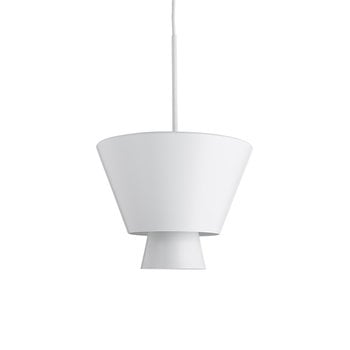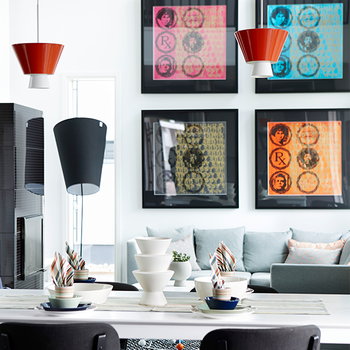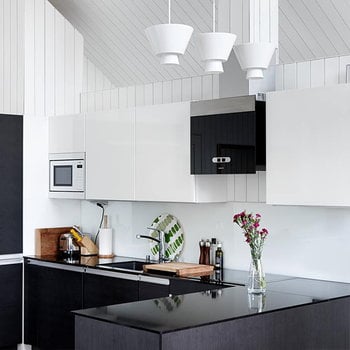Lundia’s Loiste pendant is composed of a lightweight steel frame and two fabric-covered shades that cast light both downwards and upwards. Loiste has a similar design than the fabric-covered Hehku pendant, but it is more compact, and its materials are painted aluminium and steel. The smaller shade comes in white and the larger one is available in three colours: black, white and sand. Designed by Jukka Korpihete, the Loiste pendant light is handmade in Finland.
Loiste pendant, white
Lundia
Description
Lundia’s Loiste pendant is composed of a lightweight steel frame and two fabric-covered shades that cast light both downwards and upwards. Loiste has a similar design than the fabric-covered Hehku pendant, but it is more compact, and its materials are painted aluminium and steel. The smaller shade comes in white and the larger one is available in three colours: black, white and sand. Designed by Jukka Korpihete, the Loiste pendant light is handmade in Finland.
Product details (10)
- Material
- Aluminium, steel
- Colour
- White
- Width
- 24 cm
- Diameter
- 24 cm
- Height
- 38 cm
- Bulb base
- G9
- Light source
- Max. 48W, recommendation: 33W halogen or 1.9W LED (not included)
- IP rating
- 20
- Cable length
- 150 cm
- Weight
- 0.7 kg
- Product ID
Designer
Jukka Korpihete (b. 1976) is a Finnish designer who is well-known especially for his atmospheric luminaires designed for brands such as Lundia and Woodnotes. Besides lighting, Korpihete has designed furniture, products, silverware as well as light installations. Finnish nature and the light of Scandinavia are important sources of inspiration for his work. Korpihete is one of the most successful Finnish designers of his generation: his work has been exhibited in museums around the world, and he has won many design awards including the Ilmari Tapiovaara Award 2011, Young Designer of the Year 2006 Award and Good Design Award 2009.
View all productsReviews (0)
Sustainability
The Product Sustainability Framework, our criteria of sustainable design, helps you find the most sustainable products in our selection. Read below which sustainability criteria this product has met.
Working conditions & labour 8/9
-
Equal opportunities for all employees
-
Commitment to UN Global Compact, fair compensation for all employees
-
Corporate responsibility requirements defined and communicated for suppliers
-
Systematic work for improved inclusion and well-being in the workplace
-
Transparent supply chain
-
Suppliers' compliance to a code of conduct ensured
-
Direct suppliers audited and certified
-
Compliance to the UN Guiding Principles on Business and Human Rights ensured in the supply chain
Eco-friendly production 9/9
-
Fair and resource-wise water-use in production
-
No incineration or landfilling of returned items
-
No use of endangered species as materials
-
No direct environmental emissions or waste (excl. GHGs) from production
-
The sustainability of direct suppliers' production is addressed and monitored
-
Production and material sourcing that respect biodiversity, animal rights, and natural ecosystems
-
Material-efficient and ecological packaging
-
Positive impact on nature’s well-being through operations that regenerate natural ecosystems
-
No potentially harmful chemicals used in own production
Climate impact 4/8
-
Company's direct greenhouse gas emissions identified and commitment to reduction
-
Product's carbon impact identified and commitment to reduction
-
Guidance on energy- and eco-efficient use of the product
-
Contribution to climate initiatives beyond the brand’s direct operations
Sustainable materials 6/6
-
Sustainable and long-lasting material choices
-
No harmful or hazardous substances
-
Responsible raw material sourcing and production
-
Materials suited for circularity: monomaterials, recyclable finishings, renewable or recycled contents etc.
-
Ecological materials: natural, biodegradable, recyclable or recycled contents
-
Outstanding materials in terms of innovativeness, responsibility, sustainability and circularity: local production or sourcing, 100 % recycled content, C2C-certification etc.
Circular design 5/5
-
High aesthetic quality promoting long-term use of the product
-
Technically durable product design and material choices
-
Design for enduring life-long quality
-
Design and support for product maintenance, repair and upgradability
-
Innovative circular design solutions: circular service system, resale platform, remanufacturing, collection of used products, etc.










